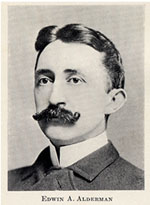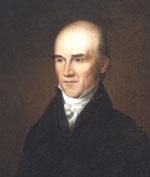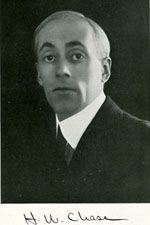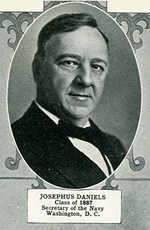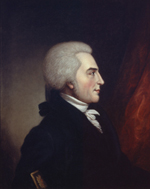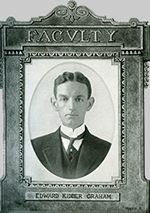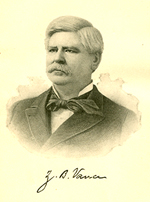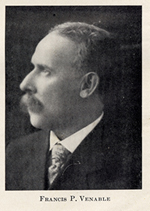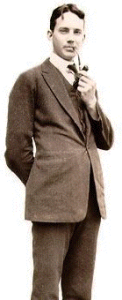What are they saying about UNC?
“The leadership in the new research movement in the South is traceable to one institution, and to certain men and women in it, namely the University of North Carolina.”
— Frederic A. Ogg, for the American Council of Learned Societies, 1928
Source: Laura Micheletti Puaca, Pioneer to Powerhouse: The History of Graduate Education at Carolina. Chapel Hill: Graduate School, University of North Carolina at Chapel Hill, 2003, p. 19.
“Our first duty is to enable the students to catch the spirit of the great masters of thought; our next is to the people, to aid in developing our resources. We owe a duty too to our women, and should open our postgraduate courses to them.”
— Edwin Anderson Alderman, President of the University of North Carolina, 1897
Source: Kemp Plummer Battle, History of the University of North Carolina. Volume II: From 1868 to 1912. Raleigh: Edwards & Broughton, 1912, p. 539.
“February 1, 1871. This old University has busted and gone to hell today.”
— Anonymous. Found written in chalk on a wall in South Building upon the reopening of the University in 1875.
Source: Kemp Plummer Battle, History of the University of North Carolina. Volume I: From Its Beginnings to the Death of President Swain, 1789-1868. Raleigh: Edwards & Broughton, 1907, p. 584.
“Chapel Hill makes no pretense of being cosmopolitan. It strives rather for an enlightened provincialism. It is primarily concerned with Southerners and the South, and it seeks to equip men to lead useful lives in a backward empire now slowly moving into what may become the most astonishing renaissance ever seen on American soil.”
— David Cohn, The Atlantic Monthly, 1941
Source: The Atlantic Monthly, March 1941, pp. 327-328.
“What I wish for today’s students and their future children is that they, too, may fall in love with this university — a love serious enough to support it and enlarge it, a love deep enough to survive the predictable lovers’ quarrels.”
— Doris Betts, Author and UNC Faculty Member, 1998
Source: Doris Waugh Betts, My Love Affair With Carolina. Chapel Hill: North Caroliniana Society Imprints number 29, 1998.
“Democracy, liberalism, culture, and religion are the cornerstones of this ancient institution.”
— Joseph Melville Broughton, Governor of North Carolina, 1941
Source: “The University and the Inter-American Institute,” speech delivered before a joint session of the General Assembly of North Carolina, Memorial Hall, Chapel Hill, 30 January 1941. In Corbitt, David Leroy, ed. Public Addresses, Letters, and Papers of Joseph Melville Broughton. Raleigh: State of North Carolina, 1950, p. 23.
“The university early excited expectations which were unfortunately too sanguine and premature to be realized. Though the attainment of knowledge may be rendered comparatively easy, it is chimerical to propose that it shall be universally, or totally, without expense.”
— Joseph Caldwell, Presiding Professor and President of the University of North Carolina, 1803.
Source: William D. Snider, Light on the Hill: A History of the University of North Carolina at Chapel Hill. Chapel Hill: University of North Carolina Press, 1992, p. 34.
“This is not a Duke kind of crowd. It’s more like a cheese-and-wine crowd, kind of laid back.”
— Sam Cassell, Florida State University basketball player, on UNC basketball fans at the Dean E. Smith Center, December 1991
Source: The News & Observer (Raleigh, N.C.), December 16, 1991.
“My own conviction constantly deepens that the next great creative chapter in the history of the nation is to be written here in the South… Somewhere in the South there must inevitably grow up an institution… which typifies and serves and guides this new civilization… My dream for the University of North Carolina is that she be nothing less than this.”
— Harry Woodburn Chase, President of the University of North Carolina, 1919
Source: William D. Snider, Light on the Hill: A History of the University of North Carolina at Chapel Hill. Chapel Hill: University of North Carolina Press, 1992, p. 178.
“This University has produced enough excellence to fill a library or lead a nation… As one who grew up in the South, I have long admired this University for understanding that our best traditions call on us to offer that light and liberty to all. Chapel Hill has always been filled with the progressive spirit.”
— President Bill Clinton at the University of North Carolina Bicentennial Celebration, October 12, 1993
Source: Steven J. Tepper. The Chronicles of the Bicentennial Observance of the University of North Carolina at Chapel Hill. Chapel Hill: UNC, 1998, pp. 223-224.
“From the coming of the first student to its open doors… the University of North Carolina at Chapel Hill has been a magic gulf stream flowing in an ever-widening current through the lives of people in the cities, the counties and the state of North Carolina and beyond — tempering the customs, traditions and habits of the people it serves and lifting them to higher levels of living wherever it has gone.”
— Albert Coates, Founder and first director of the Institute of Government at the University of North Carolina
Source: Albert Coates, The University of North Carolina at Chapel Hill: A Magic Gulf Stream in the Life of North Carolina, 1978. p. 34
“Ever since coming to North Carolina I have been impressed with the loyalty and love North Carolinians have for their native state… And of all places in North Carolina, Chapel Hill and the University.”
— Gladys Hall Coates, co-author of “The Story of Student Government in the University of North Carolina at Chapel Hill” and UNC benefactor, 1979
Source: Gladys Hall Coates, Fifty Years with Albert Coates. Chapel Hill: University of North Carolina, 1979, p. 8.
“Nobody ever gets over being a Tar Heel.”
— Bill Currie, Journalist, 1996
Source: Art Chansky, The Dean’s List: A Celebration of Tar Heel Basketball and Dean Smith. New York: Warner Books, 1996, p. viii.
“The university at Chapel Hill serves as a symbol for unity in aspiration as do few other institutions in the country… North Carolina was so long in ignorance, so long in poverty! Its people today are restless in the consciousness of their former stagnation. Chapel Hill is no longer remote, embodies their aspiration that the vale may become the mountain (if, indeed, already it has not!) — that the inconsiderable people between the two aristocracies [South Carolina and Virginia] may yet accomplish a greater destiny than either.”
— Jonathan Daniels, author and editor of the News & Observer, 1939
Source: North Carolina: A Guide to the Old North State. Compiled and written by the Federal Writers’ Project of the Federal Works Agency Work Projects Administration. Chapel Hill: UNC Press, 1939, p. 6.
“Hospitality prevailed in the University village of Chapel Hill, and it would be hard to find a place in the world of such elevated social life.”
— Josephus Daniels, publisher of the News & Observer, on the University of North Carolina in the 1880s
Source: Josephus Daniels. Tar Heel Editor. Chapel Hill: University of North Carolina Press, 1939, p. 234.
“This town [Chapel Hill] being the only seat of learning immediately under the patronage of the public, possessing the advantages of a central situation, on some of the most public roads in the state, in a plentiful country and excelled by few places in the world, either for beauty of situation or salubrity of air, promises, with all moral certainty, to be a place of growing and permanent importance.”
— William Richardson Davie, “Father of the University,” 1793
Source: William D. Snider, Light on the Hill: A History of the University of North Carolina at Chapel Hill. Chapel Hill: University of North Carolina Press, 1992, p. 16.
“I am glad I was accepted.”
— Edward O. Diggs, First African American admitted to the University of North Carolina, after learning of his acceptance by the UNC medical school, April 24, 1951
Source: The News and Observer (Raleigh, N.C.), April 25, 1951. In University of North Carolina at Chapel Hill clippings, North Carolina Collection, p. 4205.
“At UNC, public service is a way of life, touching all of North Carolina.”
— Senator John Edwards at the May 2002 Commencement
Source: Commencement address, May 19, 2002, published by UNC News Services. North Carolina Collection.
“Generation after generation, since the days of the American Revolution, Chapel Hill has been extremely productive of talent. As a state university, it is uniquely successful, and almost every phase of enlightenment and progress in the state, and to some extent in the South, can trace its birth to this small town.”
— John Ehle, author, 1965
Source: John Ehle, The Free Men. New York: Harper & Row, 1965, pp 96-97.
“I’ve never gotten over the first time I entered Wilson Library. I never knew there were so many books in the world.”
— Shelby Foote, author
Source: UNC Friends of the Library page in the Alumni Review, November/December 2003, p. 58.
“The constitutional obligation to foster the University is upon us. And we can gain the approval of posterity by exerting ourselves on behalf of this institution, until the University of North Carolina shall become a synonym for all that is progressive in science or elevating in education.”
— Daniel G. Fowle, Governor of North Carolina, 1889
Source: The News & Observer (Raleigh, N.C.), December 16, 1991.
“The problems of the people are the problems the university must deal with.”
— William Friday, President of the University of North Carolina system from 1956-1986, in a 1993 interview
Source: Sarah Friday, “The University at Chapel Hill in Public Service: Community Partners.” Popular Government, Fall 1993, vol. 59, no. 2, p. 2.
“We may, therefore, say that while its soul is the spirit of the men who teach and are taught — the heart of a true university is its library. It is the safety-deposit vault in which is kept the past’s legacy for the present and the future. It is the quiet sector in the life of the busy university where imperialists in the realm of truth may happily dream of new frontiers. And it is, finally, an index of our progress as a people.”
— O. Max Gardner, Governor of North Carolina, 1929
Source: Address delivered at the dedication of the new library of the University of North Carolina, Chapel Hill, October 19, 1929. In David Leroy Corbitt, ed., Public Papers and Letters of Oliver Max Gardner. Raleigh: State of North Carolina, 1937, p. 130.
“We hope to make the campus co-extensive with the boundaries of the State.”
— Edward Kidder Graham, President of the University of North Carolina, 1914
Source: Archibald Henderson, “The President.” University Magazine, June 1915, p. 286.
“In Chapel Hill among a friendly folk, this old university, the first state university to open its doors, stands on a hill set in the midst of beautiful forests under the skies that give their color and their charm to the life of youth gathered here… there is music in the air of the place.”
— Frank Porter Graham, President of the University of North Carolina, 1931
Source: Inaugural address, November 11, 1931, quoted in Donna B. Clark, Days on the Hill 1995: A Calendar for Tar Heels. Charlotte, N.C.: InfoSupply, 1994.
“The university is like a lighthouse which throws a beam out to the far horizons of the South, yet is dark at its own base.”
— Paul Green, playwright
Source: John Ehle, The Free Men. New York: Harper & Row, 1965, p. 284.
“Our mission has always been a three-legged stool: first, vital teaching; second, cutting-edge research; third, distinguished public service.”
— Paul Hardin, Chancellor, University of North Carolina at Chapel Hill, 1993
Source: Sarah Friday, “The University at Chapel Hill in Public Service: Community Partners.” Popular Government Fall 1993,. vol. 59, no. 2, p. 2.
“Meanwhile, some of the arrogant students at Chapel Hill continue to strut and threaten. It will suit us just as well if they continue to act like the jackals that they have proved themselves to be. If nothing else, they may serve as useful reminders to an apprehensive public that discipline is not in over-abundance on our campuses.”
— Jesse Helms, television commentator and U.S. Senator, 1966
Source: WRAL-TV “Viewpoint” number 1306, March 4, 1966. North Carolina Collection.
“The University of North Carolina is the lengthened shadow, not of one man, but of a whole people, the ‘freest of the free,’ united in a grand struggle for civil and religious liberty.”
— John Sprunt Hill, Banker and Philanthropist, 1903
Source: John Sprunt Hill, “Address Before the Alumni Association of the University of North Carolina, June 2, 1903,” p. 9. North Carolina Collection.
“It is hoped that the rays of light from your university, the Sun of Science, will illuminate the darkness of society, and chase away ignorance and vice… With all due respect to the faculty of the University of North Carolina… they seem to constitute as motley a group as I have lately heard of. Presbyterians and Arians, infidels and Roman Catholics. Bless me, what a collection. The Age of Reason has surely come.”
— John Henry Hobart, in a letter to his former Princeton classmate and University of North Carolina Presiding Professor Joseph Caldwell, 1796
Source: William D. Snider, Light on the Hill: A History of the University of North Carolina at Chapel Hill. Chapel Hill: University of North Carolina Press, 1992, p. 33.
“Many have asked, ‘Why is the University of North Carolina outstanding? Why is it unique?’… I would suggest that the University is outstanding because it is a leader. It has exercised leadership in the unceasing fight for higher standards of education throughout North Carolina, and its influence has been felt in every corner of the state.”
— Luther Hodges, Governor of North Carolina, 1960
Source: Remarks at the dedication of the School of Journalism building at the University of North Carolina, Chapel Hill, October 21, 1960. In James W. Patton, ed., Messages Addresses, and Public Papers of Luther Hartwell Hodges. Raleigh: State of North Carolina, 1963, p. 459.
“From the very first moment, my memories of Chapel Hill carry with them a quality of magic which is present to this day. As soon as I step on campus, I am filled with that feeling of respect, of awe, of magic. So it is a dream come true, a dream of a lifetime, to be able to come back to Chapel Hill as the chancellor of this campus.”
— Michael Hooker, Chancellor of the University of North Carolina at Chapel Hill, 1995
Source: “A Celebration of the Life of Michael Hooker,” July 2, 1999. North Carolina Collection.
“Having got in the way of carrying fruit to the college at Chapel Hill on the Sabbath, the collegians who, for their diversion, were fond of pranking with the country servants who resorted there for the same purpose that I did, began also to prank with me. But somehow or other they discovered a spark of genius in me, either by discourse or other means, which excited their curiosity, and they often eagerly insisted on me to spout, as they called it.”
— George Moses Horton, Poet, 1845
Source: George Moses Horton. The Poetical Works of George M. Horton, the Colored Bard of North Carolina, to which is Prefixed the Life of the Author, Written by Himself. Hillsborough, N.C., 1845, pp. xiii-xiv.
“As I saw Franklin Street in 1912, it was a dusty red avenue cut through a forest of magnificent trees… My first impression of Chapel Hill was trees; my last impression is trees… It is no wonder that Chapel Hillians are ardent tree worshippers and the symbol of the place is Davie Poplar.”
— Robert B. House, Chancellor of the University of North Carolina from 1945-1957, in 1964
Source: Robert B. House. The Light that Shines, Chapel Hill, 1912-1916. Chapel Hill: University of North Carolina Press, 1964.
“I deny the feasibility of the plan adopted, viz. by a University — which I pronounce to be the most partial and unjust institution on which the public money could have been lavished… [t]he advantage to be derived is confined to a few — many persons living in eastern, western and southern counties, whose circumstances would admit, will by the distance be deferred from sending their sons to the University”
— “IGNORAMUS,” anonymous letter published in the North Carolina Journal, 1793
Source: “‘IGNORAMUS’ Returns to the Attack, February 6, 1793” in R.D.W Connor, A Documentary History of the University of North Carolina: 1776-1799. Chapel Hill: University of North Carolina Press, 1953.
“But I hope better things, and, judging from the past of the future, I flatter myself that the rays of knowledge, with virtue attendant, diverging from Chapel Hill, shall illumine not only the state of North-Carolina, but the utmost limits of the United States.”
— Willie Jones, speaker at the first graduation exercises at the University of North Carolina, 1798
Source: “An Account of the Commencement of 1798,” July 23 1798, North Carolina Journal; in R.D.W. Connor, A Documentary History of the University of North Carolina: 1776-1799. Chapel Hill: University of North Carolina Press, 1953.
“This is a great institution with a great tradition and with devoted alumni, and with the support of the people of this State. Its establishment and continued functioning, like that of all great Universities, has required great sacrifice by the people of North Carolina.”
— President John F. Kennedy at University Day, October 12, 1961
Source: “Address of the President at the University of North Carolina, University Day at Kenan Stadium, October 12, 1961.” North Carolina Collection.
“What is it that binds us to this place as to no other? It is not the well or the bell or the stone walls. Or the crisp October nights or the memory of dogwoods blooming. Our loyalty is not only to William Richardson Davie, though we are proud of what he did 200 years ago today. Nor even to Dean Smith, though we are proud of what he did last March. No, our love for this place is based on the fact that it is, as it was meant to be, the University of the people.”
— Charles Kuralt, Journalist, Host of “On the Road” and “Sunday Morning,” at the UNC Bicentennial in 1993
Source: Steven J. Tepper. The Chronicles of the Bicentennial Observance of the University of North Carolina at Chapel Hill. Chapel Hill: University of North Carolina, 1998, p. 219.
“The seat of the University was next sought for, and the public eye selected Chapel Hill—a lovely situation—in the center of the state—at a convenient distance from the Capital—in a healthy and fertile neighborhood. May this hill be for religion as the ancient hill of Zion; and for literature and the muses, may it surpass the ancient Parnassus! We this day enjoy the pleasure of seeing the cornerstone of the University, its foundations, its materials and the architect for the building; and we hope ere long to see its stately walls and spire ascending to their summit. Ere long we hope to see it adorned with an elegant village, accommodated with all the necessaries and conveniences of civilized society.”
— Samuel E. McCorkle, address to trustees and spectators at the laying of the cornerstone of Old East, October 12, 1793
Source: William D. Snider, Light on the Hill: A History of the University of North Carolina at Chapel Hill. Chapel Hill: University of North Carolina Press, 1992, p. 22-23.
“Our Alumni have been, are now, and if we do our duty to the University, among the foremost leaders of public opinion and thought in the State and the pioneers of every good work.”
— John Manning, Lawyer and Congressman, 1884
Source: John Manning, “Address Before the Alumni Association of the University of North Carolina,” 1884, p. 4. North Carolina Collection.
“The first impression of enlightened strangers [of the university] is uniformly favorable, but when we show them our library and inform them that we have little or no philosophical apparatus, we sink even more than is reasonable in their estimation.”
— Elisha Mitchell, Professor of Mathematics and Natural History at the University of North Carolina, 1824
Source: Kemp Plummer Battle, History of the University of North Carolina. Volume I: From Its Beginnings to the Death of President Swain, 1789-1868. Raleigh: Edwards & Broughton, 1907, p. 281.
“After more than three years as your chancellor, I can tell you that Carolina remains as magical a place to me as it did from the moment I first set foot on this beautiful campus… The people of Carolina have always found ways to do the remarkable, the right, the just thing. That is a characteristic that will forever mark this University.”
— James Moeser, Chancellor of the University of North Carolina at Chapel Hill, 2003
Source: James Moeser, “State of the University Address,” October 1, 2003. Published by UNC News Services. North Carolina Collection.
“…North Carolina may have the best college town in America. Chapel Hill’s size, atmosphere, appearance, location, resources, and spirit are difficult to surpass. Yes, Williamsburg, Virginia, makes the more perfect postcard; Boston is more cosmopolitan; Palo Alto has ideal weather; Austin, Texas, is ascending… but Chapel Hill is the College Town.”
— Richard Moll, former director of admissions at Bowdoin College and author, in The Public Ivys: A Guide to America’s Best Public Undergraduate Colleges and Universities
Source: Richard Moll, The Public Ivys: A Guide to America’s Best Public Undergraduate Colleges and Universities. New York: Viking, 1985, p. 85.
“This institution has been in operation for twenty years, and has been eminently useful to the state. It has contributed, perhaps, more than any other cause, to diffuse a taste for reading among the people, and excite a spirit of liberal improvement; it has contributed to change our manners and elevate our character; it has given to society many useful members; not only in the liberal professions, but in the walks of private life…”
— Archibald D. Murphey in his “Report on Education Submitted to the Legislature of North Carolina, 1817.”
Source: Archibald D. Murphey, “Report on Education Submitted to the Legislature of North Carolina, 1817.” In The Papers of Archibald D. Murphey, ed. William Henry Hoyt. Volume two. Raleigh: North Carolina Historical Commission, 1914, p. 73.
“Well may university lovers rejoice over the munificent benefaction, because it will definitely put Chapel Hill on a real university basis, swelling the State income to proportions that will make many things possible, and will doubtless break a broad way for future benefactions of great moment to the State and its venerable center of education.”
— New York Sun, on the bequest of Mary Lily Kenan Flagler Bingham establishing the Kenan Professorships, 1917
Source: Almonte C. Howell, The Kenan Professorships. Chapel Hill: University of North Carolina Press, 1956, p. 17.
“Article 41: That a school or schools be established by the Legislature, for the convenient Instruction of Youth, with such Salaries to the Masters, paid by the Public, as may enable them to instruct at low prices; and all useful Learning shall be duly encouraged and promoted in one or more universities.”
— North Carolina Constitution of 1776
Source: John L. Cheney, Jr., ed. North Carolina Government, 1585-1979: A Narrative and Statistical History. Raleigh: North Carolina Department of the Secretary of State, 1981, p. 815
“What we learned at Chapel Hill was not chemistry and economics and mathematics. Those were the instruments of learning. We learned, we absorbed, with Frank Porter Graham as our master teacher, that solid tradition, those hopes of this university born of the beginnings of a new nation, values this great university continues to nourish — freedom and liberty and tolerance, the search for truth, the defense of dignity, courage to arrive freely at convictions, and the personal courage to stand for those hopes and truths.”
— Terry Sanford, Governor and U.S. Senator, in his University Day Address, October 12, 1987
Source: Terry Sanford, “University Values, the Age of the People: University Day Address, the University of North Carolina at Chapel Hill, October 12, 1987.” North Carolina Collection.
“One problem, at least in the past, has been that the university at Chapel Hill has had too much of a ‘closed shop’ attitude… The university… continues rightfully to be a strong force in the state and the South, but it is no longer the alpha and omega of all wisdom, knowledge and power.”
— Robert W. Scott, Governor of North Carolina, 1970
Source: William D. Snider, Light on the Hill: A History of the University of North Carolina at Chapel Hill. Chapel Hill: University of North Carolina Press, 1992, p. 304.
“I am blessed to have gone to school here for four years. You all are blessed for the same reason. And you won’t realize the depth of it until later on in life, and that’s natural. All of us who have gone to school here, we know that there is something very special about this place — the tradition, the campus, the social life, the academic life. That’s why those kids eight miles down Highway 15-501 love to playa hate on us, don’t they? Jealousy is an ugly emotion, isn’t it?”
— Stuart Scott, ESPN Anchor, at the May 2001 Commencement
Source: Commencement speech, May 20, 2001. Carolina News Services press release May 22, 2001. North Carolina Collection.
“Every North Carolina citizen should be proud of our University, and also the other universities and colleges in North Carolina, but when they begin to use academic freedom as an excuse to entertain a bunch of God-denying liars to try to find out what the truth is, somebody has already been brain-washed, and it ain’t altogether students either.”
— Chub Seawell, lawyer and television commentator, 1966
Source: WRAL-TV “Viewpoint” number 1312, March 14, 1966. North Carolina Collection.
“Athletics is to the university like the front porch is to a home. It is the most visible part, yet certainly not the most important.”
— Dean Smith, UNC Basketball coach, 1961-1997
Source: William D. Snider, Light on the Hill: A History of the University of North Carolina at Chapel Hill. Chapel Hill: University of North Carolina Press, 1992, p. 324-325.
“Everyone is proud of the University of North Carolina, and its able faculty, but it is well known that within this faculty is a small group of radicals who are in an insidious manner, eternally fighting that which they frantically call ‘capitalism.'”
— David Clark, Editor, Southern Textile Bulletin, 1930
Source: Warren Ashby, Frank Porter Graham: A Southern Liberal. Winston-Salem, N.C.: John F. Blair, 1980, p. 78.
“The people must now endow and sustain this Institution. It is their own, devoted to their best interests, fostered by their best men, appealing to their best feelings, no sordid or vindictive motives have been shown by those who have revived it, they call on all classes, all parties to unite in the effort to sustain them.”
— Cornelia Phillips Spencer, author, editorialist, and advocate for the University of North Carolina, after the re-opening of UNC, 1875
Source: Cornelia Phillips Spencer, Selected Papers, edited by Louis R. Wilson. Chapel Hill: University of North Carolina Press, 1953, p. 689.
“Chapel Hill represents a college town, in the best sense. It’s the purest example we could find of a town that is defined by a university — and a good university.”
— Sports Illustrated, 1992
Source: Sports Illustrated, August 31, 1992.
“It is ironic that a few centuries ago, the universities had to free themselves from repressive church control. Now, we are refugees from a repressive university.”
— Gary Waller of Students for a Democratic Society, introducing Herbert Aptheker at Chapel Hill’s Community Church March 9, 1966
Source: William J. Billingsley, Communists on Campus: Race, Politics, and the Public University in Sixties North Carolina. Athens: University of Georgia Press, 1999.
“With the close of the football season of 1913 all eyes are now turned to basketball. It is a sport that is practically new with the University, having been in vogue here for only a few years, but one that is gaining ground.”
— The Tar Heel, December 11, 1913
“This is a beautiful place indeed. The main college buildings are 3 in number each 3 story high coloured yellow and surrounded with neat terraces of earth thrown up and platted down with grass… They are all situated in a beautiful oak & poplar grove, checkered off with splendid white gravel walks, set out in shrubbery, and the whole, I suppose about 20 or more acres surrounded with a stone wall neatly put up.”
— Zebulon B. Vance, Governor of North Carolina, 1862-1865, 1877-1879, on the University of North Carolina in the 1850s
Source: Letter from Zebulon B. Vance to Martha E. Weaver, August 12, [1851]. The Papers of Zebulon Baird Vance. Volume one. Raleigh: State Department of Archives and History, 1963, p. 4.
“There is some talk in these days of the greater advantages of the small college. It is easy to see that the question is rather one of small classes and that the small college with its over-worked professors and poor equipment can offer little to compare with the fine equipment, high-priced teachers, and small classes of the greater university.”
— Francis Venable, President of the University of North Carolina, 1900-1914
Source: Louis Round Wilson, The University of North Carolina, 1900-1930. Chapel Hill: University of North Carolina Press, 1957, p. 49.
“Chapel Hill is so smug and self-righteous and so proud of the past that it has not really kept pace with the current situation. It has been so willing to live on the moral capital of men like Odum and Graham that it is now fearfully close to being morally bankrupt.”
— David McReynolds, The Village Voice, 1963
Source: John Ehle, The Free Men. New York: Harper & Row, 1965, p 131.
“I knew that the grip of orthodoxy in the South must be broken. The University could not do its work until liberalised. With it liberalised, then the State could follow.”
— Horace Williams, Professor of Philosophy, University of North Carolina, 1936
Source: Horace Williams, The Education of Horace Williams. Chapel Hill: Published by the author, 1936, p. 55.
“So far from forgetting the blessed place, I think my picture of it grows clearer every year: it was as close to magic as I’ve ever been…”
— Novelist Thomas Wolfe in a letter to his friend and former UNC classmate Benjamin Cone, July 27, 1929.
The image of Thomas Wolfe on the UNC campus in the 1920s is from the North Carolina Collection Photographic Archives and may not be reproduced without written permission from the Collection.

